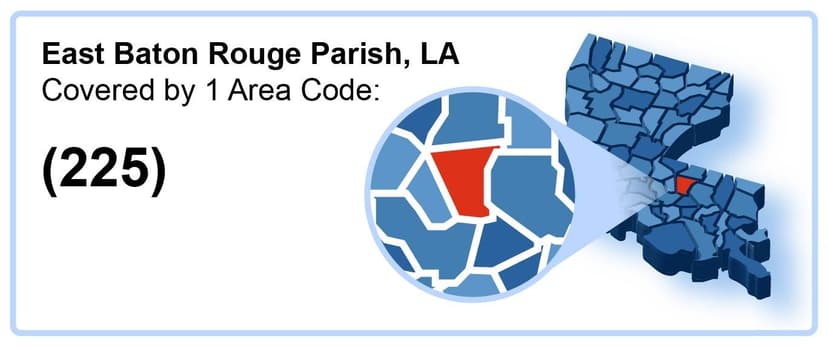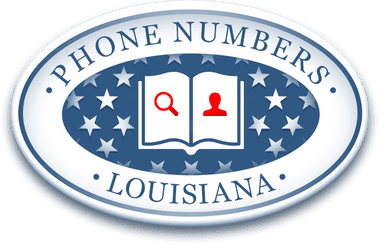What are East Baton Rouge Parish Area Codes?

East Baton Rouge Parish area code refers to the three-digit numeric code that identifies the numbering plan area (NPA) that covers East Baton Rouge Parish. Like the rest of the country, the North American Numbering Plan (NANP) divided service territories in Louisiana into NPAs and used area codes to designate the different NPAs. An area code is the set of three-digit numbers that begin all 10-digit telephone numbers in North America. The Louisiana Public Service Commission implements and manages the East Baton Rouge Parish area code. There is only one area code currently active in East Baton Rouge Parish.
Area Code 225
225 is a NANP telephone area code for parts of southern Louisiana, comprising the entire nine-parish Baton Rouge metropolitan area including East Baton Rouge Parish. Area code 225 split from area code 504 in 1998. Cities in East Baton Rouge Parish under this NPA include Baker, Baton Rouge, Central, and Zachary.
What are the Best Cell Phone Plans in East Baton Rouge Parish?
A 2018 National Center for Health Statistics survey report suggested that wireless telephony services had become the dominant form of telecommunication in Louisiana. The report stated that 57.6% of adults and 67.8% of children in the state relied solely on wireless telephony for telecoms services. Only about 4.2% of adults and 2.7% of children in the state resided in households that used landline-only telephony services.
Wireless telephony services are pretty good in Louisiana. All four major carriers are present and provide decent coverage in the state. AT&T, Verizon, and T-Mobile all boast over 90% coverage in the state while Sprint covers about 58% of the state. There are also several MVNOs that offer telephony services at cheaper rates than the major carriers. Mobile Virtual Network Operators (MVNOs) are smaller operators that utilize the major carriers’ network infrastructure to provide telephony services.
VoIP (Voice over Internet Protocol) uses IP data networks, typically the internet, to deliver telephony services instead of copper wires and radio waves. The use of broadband internet connections for service delivery allows VoIP to provide more efficient and flexible services that are cheaper than regular telephony services. Several providers offer VoIP services for business and individual users in East Baton Rouge Parish.
What are East Baton Rouge Parish Phone Scams?
These are fraudulent actions committed against East Baton Rouge Parish residents using telephony services such as live calls, automated calls, and text messages. These acts aim to steal money and confidential information from unsuspecting residents. Reverse phone searches used for suspicious phone number lookups can retrieve information about these phone numbers’ owners.
The Louisiana Attorney-General receives complaints from residents about scams and other unfair practices. Residents can contact the Office of the Louisiana Attorney-General at (225) 326-6465. Residents can also submit phone scams reports to their local law enforcement agencies and the FTC. Some common East Baton Rouge Parish phone scams are:
What is the NCUA Scam?
The National Credit Union Administration (NCUA) alerts residents of fraudulent text messages, purportedly from the NCUA phone line, requesting personal and financial information. Scammers use spoofing tactics to mimic the NCUA telephone number and generate text messages sent to their targets. The text messages warn of debit card limits and other credit issues to persuade the victims to provide information that can be used to commit financial frauds and identity theft. Residents that respond to these text messages open themselves up to severe liabilities as a result.
The NCUA informs residents that it does not request customer information through unsolicited messages. Residents should not click on any links, provide information, or engage in financial transactions based on unsolicited text messages. Residents should disregard such texts and contact the NCUA customer assistance center hotline at 1 (800) 755-1030. If you suspect you have revealed sensitive information to such scammers, contact your financial institutions immediately. Residents can file reports of these scams with their local law enforcement agency or the FTC.
What are Law Enforcement Impersonation Scams?
Scammers call East Baton Rouge Parish residents while impersonating law enforcement, usually officers of the Sheriff’s Office and the local police departments. The callers may spoof targets’ caller IDs to display the caller information of these agencies. They tell their targets that there are outstanding warrants for missing court appearances and unpaid tickets. The fake officers demand payments to settle the warrants and threaten to arrest residents who hesitate to comply. They ask for payments via wire transfers, prepaid debit cards, and retail gift cards. In some instances, they ask for financial information or arrange to meet the victims at specific locations to collect cash.
The East Baton Rouge Parish Sheriff’s Office (EBRSO) reminds parish residents that it will never ask for money to settle outstanding warrants. Disregard phone calls purportedly from law enforcement that ask for payments through prepaid cards and wire transfers. Residents who receive these calls should hang up immediately. Contact the EBRSO or your local police department directly to make inquiries and report the phone calls.
What are One-Ring Scams?
Residents receive phone calls, usually late at night, that ring out once or twice and then cut off. The scam calls are generally from strange area codes, and they aim to get the victims to call back. In instances where the targets do not call back, the scammers leave voicemails, giving them reasons to do so. Residents who call these phone numbers back find themselves connected to international phone numbers. They are charged for international connections and premium per-minute toll fees, which they only find out about in their monthly bills. These phone calls originate from foreign countries, which also use three-digit codes for their international country codes, such as Sierra Leone (232). Phone number lookup services can identify international phone calls and the countries where they originate. Do not return phone calls to places where you have no business or contacts.
What are Robocalls and Spam Calls?
A robocall is a telemarketing tool used by sales companies and political campaigns to contact multiple recipients. It is also used by organizations that make public service announcements. Its popularity is because robocalls deliver pre-recorded messages that have been programmed to play when these phone calls are answered. Users of robocalls are able to contact several residents and deliver their messages with very little human involvement.
Scammers are attracted to robocalls for these reasons and have made them tools of the trade. Robocalls enable scammers to impersonate legitimate organizations more convincingly, and this increases the likelihood of success. A reverse phone number lookup application can identify if an incoming call is a robocall. The best options to deal with illegal robocalls include:
- Add your phone number to any or both of the available Do Not Call Lists. The National Do Not Call Registry and Louisiana Do Not Call List exempt registrants from receiving most forms of unwanted telephone solicitations. If you still receive unwanted spam calls after registering on these lists, treat them as potential scam calls.
- Report illegal telephone solicitations to the FTC online or call 1 (888) 382-1222. If you added your phone number to the Louisiana List, file complaints on illegal calls by calling (225) 219-7521 or by email. Information is also available from the FTC website on blocking unwanted calls on any platform.
- End a robocall once you identify it as such. Robocalls try to engage you on the phone by offering options, but these just identify your phone number as active and redirect more robocalls.
- Inquire from your phone service providers about tools that can identify and block spam calls. Similar tools also appear as features from phone manufacturers in their devices.
- Identify the registrants of the numbers used for robocalls and spam calls with reverse phone number lookup free services.
How to Spot and Report East Baton Rouge Parish Phone Scams?
The following are indicators that unknown callers are trying to run scams:
- The callers want payments with prepaid debit cards, retail gift cards, wire transfers, and such irregular methods. Legitimate organizations will never demand payments through such means, but scammers always do. Funds sent through these means are hard to trace and retrieve.
- The callers claim to be from reputable organizations or government agencies but aggressively solicit your personal and financial information. Legitimate entities such as financial institutions and government agencies will never request customer personal information on unsolicited phone calls.
- The callers claim you are a winner in competitions you did not enter. They then tell you to make upfront payments before receiving the prizes. These are scams. You cannot win a prize in a competition you did not enter.
- The callers present business and investment opportunities with high yields and low risks and want immediate commitments. Treat such phone calls as suspicious. Do not trust callers who offer financial options but do not allow you time to consider but insist on immediate commitments.
- The callers claim to be law enforcement and threaten you with arrest or some other punitive action to get you to comply with their demands. Real law enforcement will never use threats on unsolicited phone calls to gain your compliance.
If you have been a victim of a phone scam in East Baton Rouge Parish, you can contact any of these agencies for assistance:
Louisiana Attorney-General - The Consumer Protection Section of the Louisiana Attorney-General receives complaints from residents about scams and other unfair practices. They also have resources that educate residents on common scams. Residents can contact the Office of the Louisiana Attorney-General at (225) 326-6465.
Local Law Enforcement Agencies - The East Baton Rouge Parish Sheriff’s Office and the municipal police departments assist residents with phone scams. Residents who are victims of phone scams can submit reports to the EBRSO Financial Crimes Unit at (225) 389-5009 or contact their local police department.
Federal Trade Commission (FTC) - The FTC is the federal authority that protects against fraudulent and duplicitous acts in the marketplace. It developed several consumer protection policies such as the National Do Not Call Registry. Phone numbers are restricted from receiving telephone solicitations after being listed for 31 days. File complaints about illegal robocalls and other phone scams with the online complaint assistant or call 1 (888) 382-1222.
Federal Communications Commission - The FCC is the federal authority that regulates interstate and international communication. They provide resources to help residents identify caller ID spoofing and block unwanted calls. The FCC has mandated all major phone carriers to install a more robust caller authentication system on their networks to deal with call spoofing. Victims of call spoofing and other phone scams can file online reports with the FCC.
